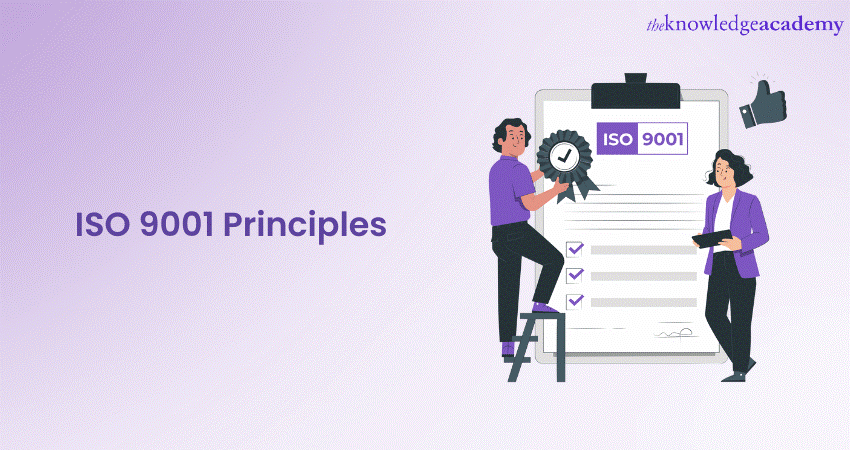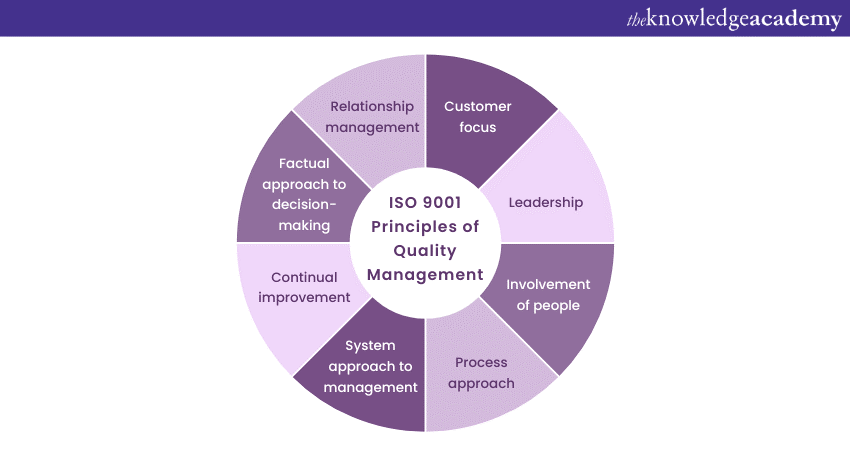We may not have the course you’re looking for. If you enquire or give us a call on 01344203999 and speak to our training experts, we may still be able to help with your training requirements.
Training Outcomes Within Your Budget!
We ensure quality, budget-alignment, and timely delivery by our expert instructors.

The modern customer always wants a guarantee from businesses that their products and services are of the best and highest quality standards. Adopting the ISO 9001 Quality Standards is a huge step towards offering a quality assurance guarantee. ISO 9001 is one of the most reputed and well-known international standards for Quality Management Systems, and the standard is based on several ISO 9001 Principles for Quality Management.
According to The ISO Survey 2021, over one million organisations worldwide have earned the ISO 9001 quality certification standards. The ever-growing demand for the certification has resulted in a hike in its popularity, leading many people to enquire about the principle that the standard is built around. Explore our blog to delve into the essential ISO 9001 Principles. Learn the key to maximising performance, productivity, and meeting risk-based ISO standards.
Table of Contents
1) An Introduction to ISO 9001
2) Fundamental principles of ISO 9001
a) Customer focus
b) Leadership
c) Involvement of people
d) Process approach
e) System approach to management
f) Continual improvement
g) Factual approach to decision-making
h) Relationship management
3) Benefits of these quality Principles for your business
4) Conclusion
An Introduction to ISO 9001
Originally published by the International Organisation for Standardization (ISO), ISO 9001 is a member of the ISO 9000 family of Quality Management standards highlighting the key difference of ISO 9000 vs 9001. It defines the requirements needed to create a robust QMS. ISO standards handle various business concerns, and ISO 9001 specialises in Quality Management System standards for enterprise-level Quality Assurance.
The ISO 9001 Quality Management System, supported by robust ISO 9001 Documentation for meeting customer needs and maintaining/improving customer satisfaction, emphasising compliance with the ISO 9001 audit checklist with standards rather than just adhering to product specifications.This is because the quality of products ultimately depends on whether and how well they meet and satisfy the customer's specific needs and requirements. ISO 9001 encourages a process-oriented management strategy by reviewing more than 20 processes highlighting the contrasting methodolgies of ISO 9001 vs Six Sigma in their approaches to process optimisation. By following the standard's suggestions, a company can help assure that it offers high-quality products and services.
Fundamental Principles of ISO 9001

At the core of the ISO 9001 framework, there are a total of eight fundamental Principles of Quality Management. These eight ISO 9001 Quality Management Principles are described in detail as follows:
Customer focus
The first Principle of ISO 9001 states that a business cannot survive without its customers. This is why organisations should strive to understand their existing and potential customers to meet their requirements and expectations better.
ISO 9001 evaluates an organisation's initiatives and objectives to help them meet customer requirements and exceed customer expectations. The customer focus Principle applies to product/service performance and customer service. Customer complaints have to be systematically logged, and the most suitable corrective actions must be taken.
The key benefits of cultivating strong customer relationships include increased market share, revenue boost, and improved customer loyalty. If one is seen as understanding and reacting appropriately to consumer demand, the success of your organisation is pretty much guaranteed – this is why you should understand this Principle thoroughly.
Leadership
This second Principle focuses on strong, purposeful and unifying leadership virtues. Leaders are tasked with the responsibility for the creation of a productive and progressive organisation environment. They are also held responsible for ensuring that future hires maintain the atmosphere. Implementing this Principle in your workplace depends upon having an established vision for the organisation and the right leaders who are in place to help promote that vision to the rest of the team. Spending time on getting this right from the get-go saves an organisation time and stress in the future.
Involvement of people
Just as your organisation would cease to exist without a customer base, it would also not go far without a balanced and multi-skilled team. Every employee at each level of the organisation is considered crucial to an organisation's success, and this Principle recognises that.
An employer should ensure that their team is motivated and engaged – not just in their daily responsibilities but also in the company. To help achieve this, the staff need to understand the significance of their role and how their roles fit into wider company objectives and claim responsibility for any problems that may hinder them from doing their job to the best of their ability.
Process approach
A process-driven approach can help companies avoid logistical problems that often arise from confusion over the right way to do things. This approach also prepares your business for the future, as having a set approach ensures no moment of panic in changing times – such as when a key team member moves on, leaving everyone panicking about the elements of their jobs.
Developing set processes for every aspect of your business, from sales to marketing and from finance to human resources, will ensure the effective utilisation of resources. This results in a cost-effective and consistent outcome. This approach also allows one to dedicate time and attention to bigger, more important and time-consuming tasks.
System approach to Management
The system approach to management Principle is closely related to the process approach Principle. It argues that identifying, understanding and managing key processes using a clear system helps streamline your business. By ensuring that team members are dedicating an appropriate amount of attention to key tasks, one can eliminate wasted time and make the organisation much more efficient.
A systematic approach to management also helps everyone have access to every stage of certain processes and stay up to date with any relevant progress. Additionally, it looks attractive and assuring for prospective new clients when your business is a well-organised one.
Continual improvement
According to the old proverb: "If you are not moving forward, you are going backwards, " an ambitious business should always push for improvements because a company can maintain its competitive edge through continuous improvement.
Continual improvement is a permanent goal for any successful organisation, irrespective of their industry. All the most prosperous organisations in the world right now have entire teams of manpower dedicated to ensuring they are always looking to improve on their past mistakes. Commitment to improvement also allows an organisation to be the market leader in their industry, as they will be the one setting the agenda – rather than simply playing catch-up to their competitors.
A factual approach to decision-making
The factual approach to decision-making approach states that effective decisions are based on rational data analysis. While an unverified gut feeling can be useful in the odd situation, it will not add up when you explain to your board of investors that your profits are down by 10% for the year.
This is why one should ensure that they have all the facts before making any influential business decisions. If you are ever questioned about why you made a decision or asked to demonstrate how that decision benefits your business, you will benefit from easy access to the data. This Principle also relies upon convenient access to reliable and accurate data, another aspect of a modern-day organisation.
Relationship management
The last Principle is relationship management, which promotes the nurturing and maintenance of healthy working relationships both with external and internal stakeholders. The most successful organisations always establish strong relationships with relevant partners, including their business associates, vendors, investors and resellers, to ensure the continuity of the all-important supply chain.
Sign up for ISO 9001 Lead Implementer to acquire the skills to implement quality standards that help achieve the organisation’s objectives. Join now!
Benefits of Quality Management Principles for your business
Combining these eight ISO 9001 Principles while pursuing ISO 9001 certification allows you to fulfil essential Standard requirements. This, in turn, improves customer satisfaction and loyalty, boosts employee engagement and productivity, and optimises resource utilisation.
The ongoing refinement of your processes not only improves cost efficiency but also allows you to seize new opportunities swiftly, ultimately expanding your market presence.
Want to become a certified ISO 9001 Lead Auditor and drive continuous organisational improvement? Sign up for our now!
Conclusion
The ISO 9001 Principles of Quality Management lay the groundwork for the ISO 9001 standard. By following and paying attention to these ISO 9001 Quality Management Principles, an organisation can fulfil the needs of their customers and maintain/improve customer satisfaction. This helps organisations in the long run, as the Principles promoted by the standard facilitate continual improvement – which helps businesses stay ahead of their industry counterparts.
Want to unlock your organisation's potential? Sign up for our comprehensive ISO 9001 Training today!
Frequently Asked Questions
Upcoming Business Improvement Resources Batches & Dates
Date
 ISO 9001 Lead Auditor Course
ISO 9001 Lead Auditor Course
Mon 20th May 2024
Mon 17th Jun 2024
Mon 15th Jul 2024
Mon 19th Aug 2024
Mon 16th Sep 2024
Mon 14th Oct 2024
Mon 11th Nov 2024
Mon 16th Dec 2024







 Top Rated Course
Top Rated Course



 If you wish to make any changes to your course, please
If you wish to make any changes to your course, please


